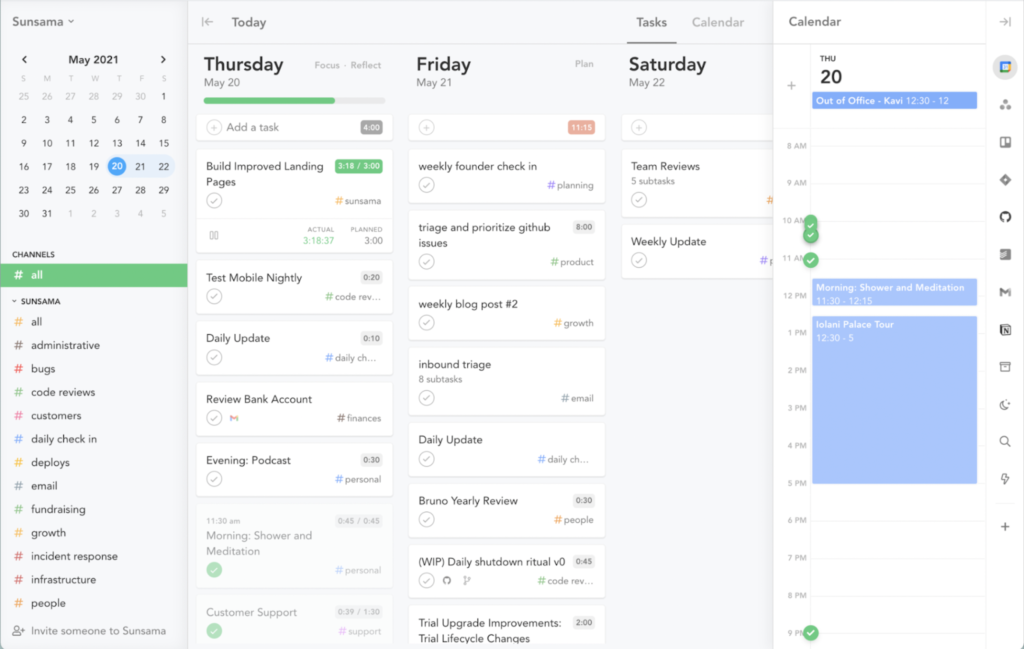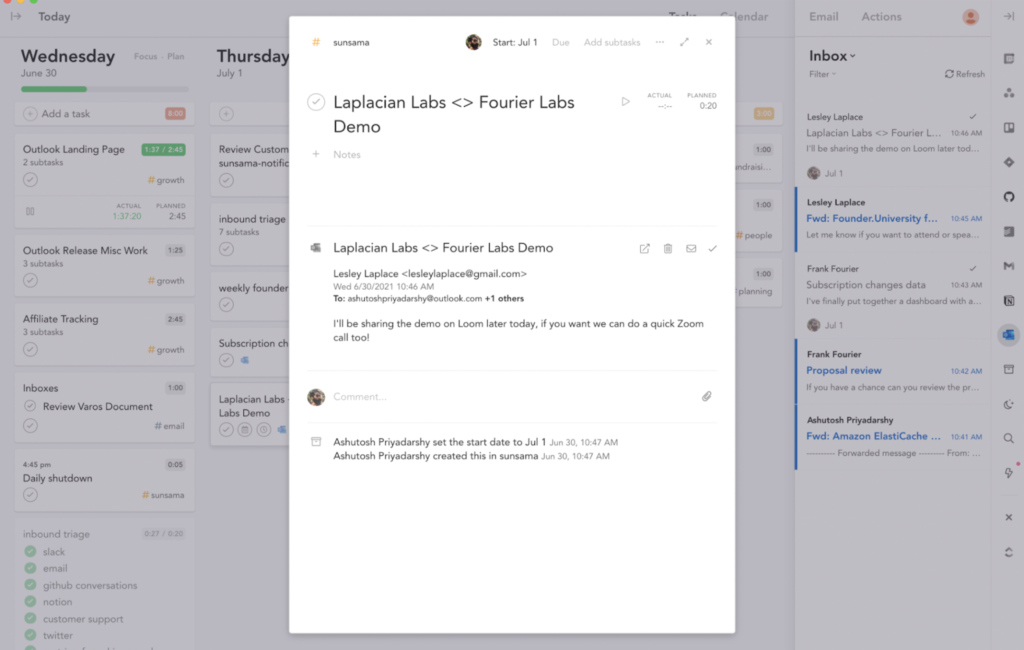Welcome to this edition of our Tools for Thought series, where we meet with founders on a mission to help us achieve our ambitions without sacrificing our mental health. Ashutosh Priyadarshy is the founder of Sunsama, a daily planner for busy professionals which helps you keep track of your tasks and calendar in one place.
In this interview, we talked about the power of consistent intentions, how a concrete plan can support your long-term ambitions, their no-shame approach to late tasks, how to achieve our goals by trying to do less everyday, and more. Enjoy the read!
Hi Ashutosh, thank you so much for agreeing to this interview. You are on a mission to help ambitious people do their best work. Can you tell us more?
One thing we noticed about ambitious people is that they live in a world where there is always more work to be done than can actually be accomplished, and their goals are things that take months or years to accomplish. For them, success happens not by finishing all the work but by focusing their time and attention on their most important work consistently.
Travis, my co-founder, and I always felt like if we can figure out how to be focused, intentional, and ambitious each day, then all we had to do was repeat that each week, each month, and each year. If we did that, we would be successful in the long run.
That sounds like a wise philosophy. So, how does Sunsama work?
Sunsama is a guided daily planner. Each morning, you get an email from Sunsama that reminds you it’s time to plan your day and teaches you the principles of working with focus, calm, and intention. Then, you open up Sunsama, where you go through a four step process to plan your work day.
First, Sunsama helps you pull your tasks and obligations from all your tools into one place. You can pull in meetings, emails, tasks from project management tools, etc. Sunsama helps you estimate how long that work will take and nudges you to pick a reasonable and achievable workload.
Finally, Sunsama can automatically put your tasks on your calendar so that you have a concrete plan of when to do your work. Once your day is planned, you don’t need to spend any more time thinking about what to do. You just work your way down your Sunsama list for the day.
Such a simple approach. Can you tell us more about the process of going from a chaotic task list to a calm work schedule?
There are three big things Sunsama does to help you feel like you aren’t drowning in work. First, Sunsama aggregates all your task tools in one place and lets you select just the tasks you want to work on for that day side by side with your meetings.
Combining your meetings and tasks gives you a realistic idea of what you can get done in a day. For example, on a day where you have four meetings, it’s not realistic to get another eight hours of heads down work done.
Second, Sunsama helps you estimate your time and see how much you are trying to get done in a day. It’s counterintuitive but if you start with a smaller and more achievable list of work for the day, you’ll actually get more done. Finally, Sunsama helps you drag and drop tasks right on to the calendar. This is the moment where you have to stop pretending because you’ve only got so much space on your calendar.
So, what about those tasks that you don’t get to tackle on a particular day?
In Sunsama, tasks that you don’t finish simply roll over to the next day. If something was important today, it’s likely going to be important the next day and you should not be penalized for not finishing something. We avoid using any aggressive red coloring or callouts for a task being overdue. Things taking longer than expected is the norm, there’s no shame in that.
However, if a task rolls over multiple days in a row, Sunsama auto-archives it. When you’ve got a task you haven’t made progress on multiple days in a row, that’s usually an indicator that the task isn’t particularly important or urgent.
A part of team work that takes a lot of time — and space in calendars — is meetings. How does Sunsama help manage this challenge?
First, we let you see your meetings side by side with your tasks. That way, you don’t feel like meetings are a constant distraction to your workday, just another thing on your to do list. In addition, Sunsama lets you add notes and action items directly to a meeting and then you can share that out to your whole team.
Are there any other ways Sunsama helps teams collaborate more effectively?
Sunsama basically functions as an “async” daily standup for teams who want to work closely together. Inside Sunsama, you can see your colleagues’ daily plans and get a clear idea of what they’re working on. If you use Sunsama, you can stop having standup meetings entirely.
That sounds great. Another thing… Many people struggle with setting too many goals or unachievable goals. What’s your advice to set reasonable goals?
I mentioned this earlier but the simplest thing you can do is try to do less things each day. It’s counterintuitive because ambitious people want to get more done. The thing you have to realize is that successful people get a few things done consistently instead of trying to do everything.
It’s also helpful to be realistic with how long work can take. For example, if I have a day where I’ve scheduled out five and half hours of focused work time, that basically eats up an entire 8-9 hour work day. Work tends to expand. I think you can be in the top percentile of focused people if you are cranking out five hours a day of heads down work.
I couldn’t agree more, it’s impossible to be highly focused for more than a few hours each day anyway.
Yes. The people who need Sunsama the most are people who need to balance heads down “maker” work with the day to day obligations of keeping business running. For a lot of people, that means doing some kind of technical, product, or creative work, but also attending meetings and doing emails.
What about you… How do you personally use Sunsama?
I start each work day by planning my day in Sunsama. One thing I rely on Sunsama for is balancing my daily work “chores” while also making sure to move substantial projects forward each day.
In Sunsama, I’ve got a recurring task that reminds me to go through all my various inboxes and notification tools, this helps me make sure that inbound/reactive work doesn’t stretch out across my whole day, I try to keep it focused to getting it done in an hour so that I can spend the rest of the day on a handful of smaller deep work priorities like building out the product.
As a founder, my favorite thing is my end of week review where I can see how much of my weekly work hours were aligned with my weekly objectives (the big important projects) and how much just goes into the day to day operations and work chores.
It’s always nice when founders actually use their products. And finally… What’s next for Sunsama?
Our team is feeling more ambitious than ever before because we just hit profitability. Now that we don’t have to worry about running out of money, we’re planning to go much deeper with all of our integrations.
Thank you so much for your time! Where can people learn more about Sunsama and give it a try?
Sure, you can check out our website to start a 14 day free trial of the product, you don’t have to put in a credit card to start. You can also follow our journey on Twitter.


